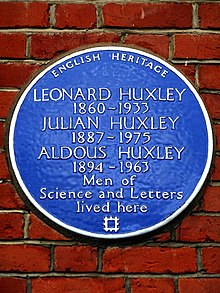ئالدۆس ھەکسلی
ئەلدوس لیۆنارد ھەکسلی (٢٦ی تەممووزی ١٨٩٤) نووسەر و فەیلەسوفێکی ئینگلیزی بوو.[١][٢][٣][٤] ئەو نزیکەی ٥٠ کتێبی نووسیوە، ھەردوو ڕۆمان و کاری ناخەیاڵی نووسیوە، ھەروەھا وتار و شیعریشی بە بەرفراوانی نووسیوە.[٥][٦]

لە بنەماڵەیەکی بەناوبانگ بەناوی ھەکسلی لەدایکبووە، لە کۆلێژی بالیۆل لە زانکۆی ئۆکسفۆرد خوێندنی تەواو کردووە، بە بڕوانامەی بەکالۆریۆس لە ئەدەبی ئینگلیزی. لە سەرەتای پیشەکەیدا، کورتەچیرۆک و شیعرەکانی بڵاوکردەوە و سەرنووسەری گۆڤاری ئەدەبی بەناوی ھۆنراوەی ئۆکسفۆرد بوو، پێش ئەوەی دەست بکات بە بڵاوکردنەوەی نووسینەکانی گەشتکردن، ساتییەر، و سیناریۆ. دوایین بەشی ژیانی لە ویلایەتە یەکگرتووەکانی ئەمریکا بەسەر برد و لە لۆس ئەنجلس ژیاوە لە ساڵی ١٩٣٧ تا مردنی.[٧] لە کۆتایی ژیانیدا، ھەکسلی بە شێوەیەکی بەربڵاو بە یەکێک لە ڕۆشنبیرە بەناوبانگەکانی سەردەمی خۆی ناسرا. نۆ جار پاڵێوراوە بۆ خەڵاتی نۆبڵی ئەدەبی و لە ساڵی ١٩٦٢ لەلایەن کۆمەڵەی شاھانەی ئەدەبییەوە ھەڵبژێردرا بۆ ھاوڕێی ئەدەبی.[٨]

ھەکسلی ئاشتیخواز بوو. حەزی لە ئەفسانەی فەلسەفی و گەردوونیزم بوو، باسی ئەم بابەتانە دەکات بە کارەکانی وەک فەلسەفەی ھەمیشەیی (١٩٤٥) کە ھاوشێوەی نێوان ئەفسانەیی ڕۆژاوایی و ڕۆژھەڵاتی و دەروازەکانی تێگەیشتن (١٩٥٤) کە ئەزموونی دەروونی خۆی لەگەڵ مێسکالین لێکدەداتەوە.[٩][١٠] لە بەناوبانگترین ڕۆمانەکەی «جیھانێکی نوێی ئازا» Brave New World (١٩٣٢) و کۆتا ڕۆمانەکەی «دوورگە» (١٩٦٢) دا، تێڕوانینی خۆی بۆ دیستۆپیا و یوتۆپیا (ناشوێن) پێشکەش کرد.
سەرچاوەکان دەستکاری
- ^ Watt, Donald, ed. (1975). Aldous Huxley. Routledge. p. 366. ISBN 978-0-415-15915-9.
Inge's agreement with Huxley on several essential points indicates the respect Huxley's position commanded from some important philosophers … And now we have a book by Aldous Huxley, duly labelled The Perennial Philosophy. … He is now quite definitely a mystical philosopher.
- ^ Sion, Ronald T. (2010). Aldous Huxley and the Search for Meaning: A Study of the Eleven Novels. McFarland & Company, Inc. p. 2. ISBN 978-0-7864-4746-6.
Aldous Huxley, as a writer of fiction in the 20th century, willingly assumes the role of a modern philosopher-king or literary prophet by examining the essence of what it means to be human in the modern age. … Huxley was a prolific genius who was always searching throughout his life for an understanding of self and one's place within the universe.
- ^ Reiff, Raychel Haugrud (2010). Aldous Huxley: Brave New World. Marshall Cavendish Corporation. p. 7. ISBN 978-0-7614-4278-3.
He was also a philosopher, mystic, social prophet, political thinker, and world traveler who had a detailed knowledge of music, medicine, science, technology, history, literature and Eastern religions.
- ^ Sawyer, Dana (2002). Aldous Huxley: A Biography. Crossroad Publishing Company. p. 187. ISBN 978-0-8245-1987-2. Retrieved 10 April 2016.
Huxley was a philosopher but his viewpoint was not determined by the intellect alone. He believed the rational mind could only speculate about truth and never find it directly.
- ^ Raychel Haugrud Reiff, Aldous Huxley: Brave New World, Marshall Cavendish (2009), p. 101
- ^ Dana Sawyer in M. Keith Booker (ed.), Encyclopedia of Literature and Politics: H–R, Greenwood Publishing Group (2005), p. 359
- ^ "The Britons who made their mark on LA". The Daily Telegraph. 11 September 2011. Archived from the original on 11 January 2022. Retrieved 5 July 2018.
- ^ "Nomination Database: Aldous Huxley". Nobel Prize.org. Retrieved 19 March 2015
- ^ Thody, Philipe (1973). Huxley: A Biographical Introduction. Scribner. ISBN 978-0-289-70188-1.
- ^ David K. Dunaway (1995). Aldous Huxley Recollected: An Oral History. Rowman Altamira. p. 90. ISBN 978-0-7619-9065-9.
- دەروازەی وێژە
- دەروازەی ژیاننامە
- دەروازەی فەلسەفە
- دەروازەی شانشینی یەکگرتوو
- دەروازەی ئینگلتەرا
- دەروازەی چیلی
- دەروازەی ھۆڵیوود
| کۆمنزی ویکیمیدیا، میدیای پەیوەندیدار بە ئالدۆس ھەکسلی تێدایە. |